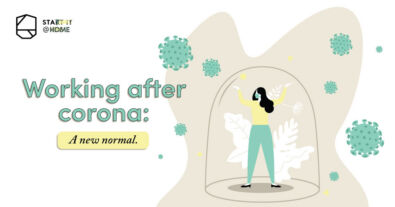Leaving normal behind: the future of work as we know it #WisdomWednesday

To say that the corona crisis has shaken things up would be an understatement. The past few months have forced us to confront and reinvent ourselves, as individuals and as entrepreneurs. As we shared in this blog post, companies suddenly had to search for new opportunities, even new business models. But now that we’re starting to get back to the new (not-so) normal, what trends are here to stay? For this week’s #WisdomWednesday we’ll take a peek at how things are taking shape going into the future.

Everything digital, everything efficient
This was the biggest digital crash course our country could have had. You see that in lots of different areas! It’s 100% certain that people have discovered the advantages and efficiency gains of working digitally. And isn’t being safer and more efficient every entrepreneur’s dream? It may seem trivial, but just think of the benefits of digitally signing documents, as our partner Monard Law explains in detail here. Saving paper and effort? Check!
Of course we still have to see whether these new digital habits will hold up. But given the growing importance of health in the workplace and the continued emphasis on social distancing, it’s already pretty clear that we’re going to be more careful about certain things. That doesn’t mean you have to be afraid of taking your company to the next level in various ways. Take hiring and recruitment for example: with their handy tips, our startup Sympl makes it clear that even this can be done remotely!
Startup Conversation Starter has even discovered new growth opportunities through the new everything digital world. After the success of their virtual networking event Veerkracht, they are launching a new edition on June 2: The Big Bounce! In any case these events show that people can also connect with each other virtually. While in the past it felt normal to be stuck in traffic for hours on the way to a meeting or event, today video conferencing has become more than normal. As our Start it @KBC mentor Ismaël Ben-Al-Lal put it during an interview with VOKA: “I think that we won’t be able to operate in a normal world again before 2021. Even then the corona crisis will have left some scars. But also good things. We’ve seen that we can do a lot from a distance, which is better for the climate and for traffic.”
Flexibility in every sense
That brings us to the question of flexibility. All this remote working has made the professional world rethink flexibility (or the lack thereof). How necessary is a permanent office really? Maybe it’s enough just to have access to a co-working or creative hub where employees can work when they need to (hint, Start it @KBC)? Flexibility could also stimulate the on-demand economy in terms of workers. Although it’s still attractive for lots of companies to recruit permanent staff, because there’s also a need for profiles who can be deployed quickly without need for training, the freelance market could see a new boom.
Of course flexibility also creates more possibilities for work-life balance: taking time for yourself and others, when and how you want! True, startup founders with kids had to get used to being with their tikes 24/7, especially at the beginning of the recent crisis. But many also appreciated being able to spend more time with their children. These tips and inspiration from Maison Slash could help them find a middle ground!
Employees as a safety net
While we’re on the topic of work-life balance: with more people going back to work, there’s an increased awareness among employees of the health and emotional wellbeing of their staff. This is just one of many ways in which employers today attract and retain talent. It’s a big responsibility, and employers have to think ahead and consider how they can look out for the health of every employee from A to Z.
Having all the necessary insurance, compensation and safe working conditions are one thing, but things like healthy lunches are also important. Be sure to check out DJAR, one of our startup members, who can help you dish up a healthy and delicious lunch!
Of course mental support is also essential. We can’t underestimate the impact of the recent crisis on mental health. If you have employees, it’s important to anticipate absenteeism, depression and burnouts with various tools and counselling programmes. At Start it @KBC we try to take the lead with our Wellbeing Academy and tips in our blogs, but we also see from our own health tech startups and partners like Carevolution that our community is ahead of the curve in responding to the need for health and wellbeing in the workplace!
A key thing to focus on is using a holistic approach: not a static, but a dynamic way of doing things that spans the entire company. That means making links between your strategy, your learning and development processes as well as employee productivity. Sounds difficult? Then check out Umital, the startup that accelerates digital transformation by measuring and improving behaviour on the work floor.
What trends did we leave out according to you? Let us know!